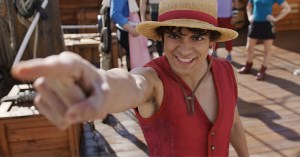Total Recall: Antonio Banderas’ Best Movies
We count down the best-reviewed work of the Puss in Boots star.
To a lot of American filmgoers, Antonio Banderas is the suave Latin heartthrob who came out of nowhere in the 1990s to star in some hits (Desperado, Evita, The Mask of Zorro) and some big misses (Assassins, Never Talk to Strangers, Play It to the Bone). But as film buffs know, Banderas is more than just the guy who co-starred in the worst-reviewed movie of the aughts. He’s built up an admirably diverse filmography over the last 30 years, and with two movies — his reunion with Pedro Almodóvar, The Skin I Live In, and this weekend’s Shrek spinoff, Puss in Boots — now playing in theaters, we decided this would be the perfect time to revisit some of the many critical highlights from his career. ¡Es tiempo para la Retirada Total!
10. Frida
Frida is absolutely Salma Hayek’s showcase, but for her Oscar-nominated turn in the central role of the Frida Kahlo biopic, director Julie Taymor surrounded Hayek with an impressive array of talented supporting players, including Alfred Molina, Edward Norton, Geoffrey Rush, Ashley Judd, and — as Kahlo’s fellow artist David Alfaro Siqueiros — Antonio Banderas. It all adds up to a film that is, in the words of Susan Stark of the Detroit News, “Passionate, provocative, hilarious, tragic and just dizzyingly beautiful to behold.”
9. Philadelphia
A year after making his English-language debut in The Mambo Kings, Banderas took a supporting role in a much more high-profile film: Jonathan Demme’s Philadelphia, which used its gaudy pedigree and a marquee cast led by Tom Hanks and Denzel Washington to break box-office taboos surrounding homosexuality, HIV, and AIDS. Hanks earned an Academy Award for his performance, one of two Oscars won by the film, and audiences turned out to the tune of more than $205 million in worldwide grosses. “It’s less like a film by Demme than the best of Frank Capra,” observed Rita Kempley for the Washington Post. “It is not just canny, corny and blatantly patriotic, but compassionate, compelling and emotionally devastating.”
8. The Mambo Kings
Warner Bros. wanted Ray Liotta for the role — and even after director Arne Glimcher successfully fought to cast Banderas in his English-language debut, he had to learn his lines phonetically. But 1992’s The Mambo Kings ultimately proved to be the international breakthrough Banderas had been working toward for a decade, and for good reason — his character’s tragic tale underscores the film’s story of musical passion and brotherly love, and his performance more than held its own with co-star Armand Assante’s. “In some ways this story is as old as the movies,” admitted Roger Ebert, “but The Mambo Kings is so filled with energy, passion and heedless vitality that it seems new, anyway.”
7. The Mask of Zorro
By the 1990s, the masked bandit Zorro had appeared in countless books, serials, TV shows, and more than a dozen feature-length films — but it wasn’t until Antonio Banderas signed on for The Mask of Zorro that the character was actually portrayed by a Spanish actor. (And yes, even then, he took over for the original Zorro — played in the film by Anthony Hopkins.) Rebooting such a venerable (some would say “tired”) character might have seemed like a recipe for disaster, but Mask swashbuckled its way to a $250 million worldwide gross and reaped praise from critics like the BBC’s Almar Haflidason, who enthused, “There are no clever ground-breaking effects, just lashings of good clean fun with desperately devilish baddies, and good guys so fantastic, so clever and witty, that they make you want to weep with pleasure.”
6. Women on the Verge of a Nervous Breakdown
Banderas and Pedro Almodóvar reunited for their fourth film in 1988, and the result proved an international breakthrough for both men. While it didn’t inspire quite as much critical adoration as their earlier outings, Women on the Verge of a Nervous Breakdown still offered plenty of vintage Almodóvar, starting with a plot that revolves around tainted gazpacho, Shiite terrorists, and the all-consuming love between an actress (Carmen Maura) and her on-again, off-again boyfriend (Fernando Guillén). “Women on the Verge is even wackier than [Almodovar’s] other films,” observed Chris Hicks of the Deseret News. “It also just happens to be more universal.”
5. Shrek 2
The law of diminishing returns tends to apply to sequels whether or not they’re successful, but when you’re talking about a critical and commercial winner as powerful as Shrek, the odds of turning in a second installment that exceeds the original are pretty slim. Shrek 2 beat the odds, due in part to a thoroughly enjoyable storyline that retained the humorous dynamic and fairytale mythology of the original while introducing terrific supporting characters — like, say, Puss in Boots (Banderas). “This fractured, very showbizzy deconstruction of fairy tales is in many ways the Godfather: Part II of animations,” wrote Joe Baltake of the Sacramento Bee, arguing that “it tops its successful predecessor.”
4. Spy Kids
By 2001, Banderas’ film career had cooled considerably from its mid-1990s peak, thanks to a series of duds such as Play It to the Bone and Two Much (although he met his eventual second wife, Melanie Griffith, on the set of the latter, so maybe we should call that one a draw). He started turning things around with his role in Robert Rodriguez’s family action-adventure hit Spy Kids, using his heroic flair as well as his comedic chops to support the antics of on-screen kids Alexa Vega and Daryl Sabara. The end result earned Banderas nominations from the ALMA and Kids’ Choice Awards — and they were, in the words of the Philadelphia Inquirer’s Carrie Rickey, “A delight for 7-year-olds, their parents, and James Bond diehards everywhere.”
3. Matador
Pedro Almodóvar dismissed Matador as one of his weakest films, but the critics strongly disagreed: both he and Banderas earned raves for their work in this typically lurid tale of a junior matador whose yearning to prove his manhood to a washed-up colleague (Nacho Martinez) leads him to try and rape the older man’s girlfriend — and then confess to a series of murders he didn’t commit. “Matador baits every bull imaginable — murder, mutilation, suicide and rape being just a few of “Matador’s” popcorn-incompatible themes,” observed Desson Howe of the Washington Post. “But the Spanish director swirls his cape over these chargers so imaginatively, shamelessly and inventively, his flamboyance wins the day.”
2. Labyrinth of Passion
What do you get when you cross the death of 40-year dictator Francisco Franco, the Spanish sexual revolution, and the singular gifts of writer/director Pedro Almodóvar? The effervescent, utterly cuckoo Labyrinth of Passion, which follows the adventures of a sex-addicted singer (Cecilia Roth), a gay Middle Eastern prince (Imanol Arias), and the young terrorist who loves him (Banderas). It all sounds a little like a 12:45 AM Fred Armisen sketch on Saturday Night Live, but it works — and according to critics like Janet Maslin of the New York Times, it “shows off the bright, gaudy visual style, the breezy manner and the exuberant energy that are Mr. Almodóvar’s particular virtues.”
1. Law of Desire
Half wrenching drama, half dizzying sexual whirlwind, Almodóvar’s Law of Desire rests on the love triangle sparked when a gay filmmaker (Eusebio Poncela) steps out on his long-term boyfriend with a young fan (Banderas) who becomes smitten after their one-night stand. Complicating matters further is Poncela’s relationship with his transsexual sister, who ultimately becomes an unwitting pawn in Banderas’ campaign to win him at any cost. As is Almodóvar’s wont, Desire hinges on larger-than-life characters and rather outlandish plot developments, but it also has a depth and empathy that led critics like Marjorie Baumgarten to hail it as a “spectacle of flamboyant melodrama, murder, and amnesia.”
In case you were wondering, here are Banderas’ top 10 movies according RT users’ scores:
1. Women on the Verge of a Nervous Breakdown — 88%
2. Philadelphia — 87%
3. Interview with the Vampire — 85%
4. Frida — 83%
5. Desperado — 79%
6. Law of Desire — 79%
7. Take the Lead — 78%
8. Matador — 75%
9. The House of the Spirits — 74%
10. The Mask of Zorro — 70%
Take a look through Banderas’ complete filmography, as well as the rest of our Total Recall archives. And don’t forget to check out the reviews for Puss in Boots.






